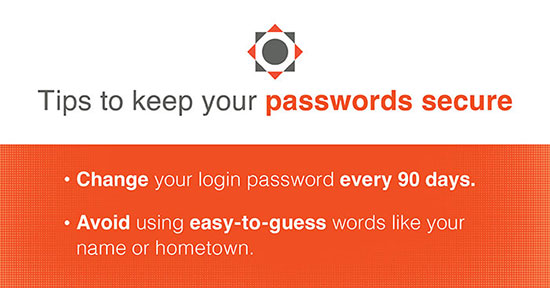Protecting your financial freedom
This article is the third installment of the “banking mistakes to avoid” series.
Modern banking and the digital world afford people great benefits and convenience. From easily paying bills online to direct deposits and accessing cash from anywhere on the go, it’s hard to deny the upside our technology brings us. But like many conveniences, there are risks associated.
This article highlights the banking mistakes to avoid when it comes to security issues – giving you the knowledge to keep your hard-earned money and financial information out of the hands of bad actors.

Protect access to your account
Every bank account comes with an account number – which is used by the account holder and bank to identify and access an account. Account numbers can be found at the bottom-middle of a check, in online banking, as well as several other financial transaction documents. It’s wise to use a multi-factor authentication system to access your account, including security questions such as inputting the name of your first pet. Because your account number can easily end up in the wrong hands, it is important to add extra layers of security through the use of multi-factor authentication.
Always endorse your checks
Endorsing, or signing, your checks is an easy way to increase your banking security. This step is to help prevent fraud in the event a check gets into the wrong hands by enabling a bank to confirm the identity of the individual seeking to deposit a check. It is possible that if a check ends up in the wrong hands, a signature could be forged, and the check cashed into the wrong account. When you receive a check, it’s ideal to deposit it as soon as possible. The most secure option is for the person writing the check to specify to the bank which account the check is to be sent to – however this requires knowing the recipients’ account number.
Take precaution at the ATM
This one might sound obvious, but it’s a critical reminder. When using an ATM, never let your guard down. When approaching and using an ATM machine that’s outside (not in a secure bank or office lobby), you’re in a potentially vulnerable position.
- Always assess your surroundings and make sure you feel safe before proceeding.
- A damaged or altered card slot or sticky residue could be a possible card skimming device, so avoid using the ATM if you suspect anything unusual on the machine.
- Be careful when entering your pin – make sure no one can see you type it in or cover the screen with your hand to be safe if a lot of people are around.
- Don’t stand around counting your cash once it’s withdrawn – immediately put the money into your wallet and wait until you’re not in public to count it.
- When using a drive-through ATM, keep all your doors locked and close your passenger windows.
In addition to taking these precautions when you’re at the ATM, it’s also important to always keep your debit card in a secure location. Your debit card is essentially cash in the sense that if it gets lost or stolen, you may have a harder time getting that money back (and a smaller time-window). Whereas with a credit card, any unauthorized charges can be disputed before the money technically leaves your pocket. For Westfield Bank customers, please know we are here to support you in the case of fraudulent charges and lost or stolen cards.
Avoid banking on public Wi-Fi or computers
Using a public Wi-Fi network and computer, such as at a library or coffee shop, increases the chances that someone else will be able to access the information you are putting into your browser. If you’re logging into your bank account, you’re risking another user being able to get a hold of that information in the browser history.
Don’t forget to change your password
It’s tempting to use the same password for all of our various accounts. But by always using the same password and not changing frequently, leaves your accounts vulnerable. Anyone who works in an office setting has likely heard this advice before. It’s recommended that you change your login password every 90 days and avoid using easy-to-guess words like your name or hometown. The longer and more unique (combination of upper- and lower-case letters, numbers, special characters, etc.) the better.
The bottom line is that you can never be too cautious when it comes to banking security. Be sure to keep this advice in mind going forward so you can stay on track for reaching your financial goals.



